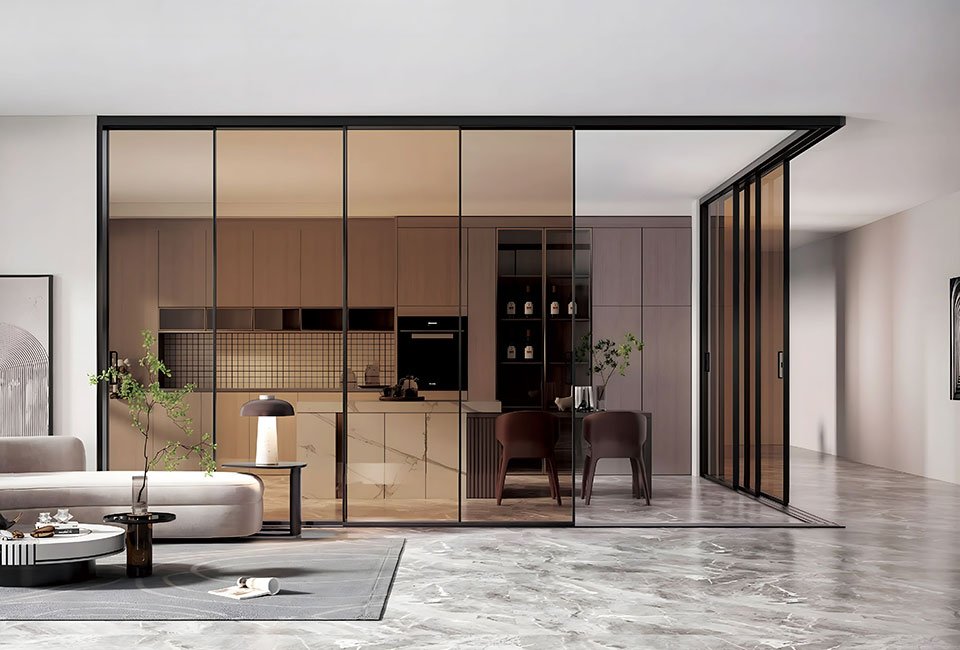When choosing windows and doors for your home or building project, understanding the materials involved is crucial for making the best decision. Two common materials are vinyl and aluminum, each with its own set of benefits and applications. Below, we’ll explore what aluminum and vinyl are, and the key differences between these two popular materials.
1. What is Aluminum?
Aluminum is a lightweight, strong, and durable metal that is commonly used in windows and doors. Known for its sleek and modern appearance, aluminum is often favored in contemporary architectural designs. Here are some key characteristics of aluminum:
- Strength: Aluminum is exceptionally strong for its weight, making it ideal for large windows and doors that need to support expansive glass panels.
- Durability: It is resistant to corrosion and weathering, especially when coated with protective finishes, making it suitable for a wide range of climates.
- Design Flexibility: Aluminum frames can be made very slim, allowing for a minimalist aesthetic with larger glass surfaces, offering more natural light and unobstructed views.
- Maintenance: Aluminum is low-maintenance and doesn’t require frequent painting or sealing.
- Recyclability: Aluminum is a highly sustainable material as it is 100% recyclable without losing its properties.
Aluminum is often chosen for its modern look, strength, and ability to accommodate larger windows and doors.

2. What is Vinyl?
Vinyl, also known as polyvinyl chloride (PVC), is a type of plastic that has become a popular material for windows and doors due to its affordability, energy efficiency, and low maintenance. Vinyl is widely used in residential homes but can also be applied in commercial buildings. Here’s why vinyl is popular:
- Energy Efficiency: Vinyl windows and doors offer excellent insulation, helping to reduce heating and cooling costs. The material doesn’t conduct heat, which helps keep interiors more comfortable.
- Cost-Effective: Vinyl is generally less expensive than aluminum, making it an attractive option for budget-conscious homeowners or builders.
- Low Maintenance: Vinyl does not need to be painted or sealed, and it resists moisture, rust, and fading, which makes it easy to maintain.
- Weather Resistance: Vinyl performs well in most climates, particularly in areas with extreme temperatures, due to its non-conductive properties.
- Aesthetic Options: While vinyl is available in a variety of colors and finishes, its frames are generally thicker than aluminum, which can limit the overall design possibilities.
Vinyl is best known for its affordability, energy efficiency, and ease of care, making it a go-to material for residential windows and doors.
3. What is the Difference Between Vinyl and Aluminum?
Though both vinyl and aluminum are widely used for windows and doors, they serve different purposes and offer unique benefits. Here are the key differences:
Strength and Durability
- Aluminum: Aluminum is stronger than vinyl, making it ideal for larger windows and doors that require greater structural integrity. Its slim frame design supports expansive glass without compromising durability.
- Vinyl: Vinyl is not as strong as aluminum, meaning its frames tend to be bulkier to maintain stability. However, vinyl holds up well under normal conditions, especially in residential applications, but can be less durable than aluminum over time, especially in very hot climates.
Energy Efficiency
- Aluminum: Aluminum is a conductor of heat, which can make it less energy efficient unless it is fitted with a thermal break—an insulating material between the inside and outside of the frame. Without this feature, aluminum windows and doors may result in higher heating and cooling costs.
- Vinyl: Vinyl is a natural insulator, providing excellent energy efficiency. Its low thermal conductivity helps maintain indoor temperatures, making it a better choice for energy-conscious buyers.
Aesthetic Flexibility
- Aluminum: Aluminum offers more design flexibility with its slim, sleek frames, making it ideal for modern and minimalist designs. It also allows for larger glass areas, which maximizes natural light and enhances views. Aluminum frames come in a variety of colors and finishes, including matte, metallic, and textured coatings.
- Vinyl: Vinyl windows and doors tend to have thicker frames due to the structural reinforcement required. While available in several colors, vinyl has fewer options when it comes to texture and finish. Some vinyl frames mimic wood, but they can’t match the fine detail or modern elegance of aluminum.
Maintenance
- Aluminum: Aluminum is relatively low-maintenance but may require more attention in coastal or humid environments where corrosion could be a concern. Protective coatings like powder-coating or anodizing are often used to prevent oxidation.
- Vinyl: Vinyl is virtually maintenance-free and doesn’t require painting or sealing. It’s highly resistant to moisture, warping, and fading, making it a popular choice for homeowners looking for a low-maintenance option.
Cost
- Aluminum: Aluminum windows and doors tend to be more expensive than vinyl due to the higher cost of raw materials and manufacturing. However, the added durability and design appeal often justify the higher price, especially for larger, upscale projects.
- Vinyl: Vinyl is the more budget-friendly option. Its manufacturing process is simpler and cheaper, making it ideal for those looking to save on initial costs without sacrificing performance.
Weather Resistance
- Aluminum: Aluminum holds up well in extreme weather conditions and is highly resistant to warping, cracking, or expanding. However, in coastal areas, untreated aluminum can corrode due to saltwater exposure, though this can be mitigated with protective finishes.
- Vinyl: Vinyl is resistant to moisture, making it a great option for areas with high humidity or rain. However, in very hot climates, vinyl can sometimes warp or soften over time if not properly reinforced.
Environmental Impact
- Aluminum: Aluminum is fully recyclable and can be reused indefinitely, making it a more sustainable choice compared to vinyl. The production process for aluminum, however, does consume a significant amount of energy.
- Vinyl: Vinyl is made from PVC, a plastic-based material, and is not as easily recyclable as aluminum. The manufacturing process also involves chemicals that can have a negative environmental impact.

Conclusion
When comparing vinyl and aluminum windows and doors, the right choice depends largely on the specific needs of your project. Aluminum is ideal for those seeking strength, durability, and a modern, minimalist aesthetic, especially for large windows and doors. Vinyl, on the other hand, offers excellent energy efficiency, low maintenance, and affordability, making it a popular choice for residential applications.
At Delanshini Doors and Windows, we provide a variety of high-quality vinyl and aluminum windows and doors to meet any architectural style or functional requirement. Contact us at wang@gddlsn.com for professional guidance and customized solutions to suit your next project.
Aluminum Windows & Doors — Basics and Guides
What Are Aluminum Windows and Doors? A Complete Guide
The Pros and Cons of Aluminum Windows: Are They Right for Your Home?
Are Aluminum Doors and Windows Safe to Use?
What are the Pros and Cons of an Aluminum Door?
What are the Benefits of an Aluminum Window?
The Difference Between Vinyl and Aluminum Windows and Doors
Energy Efficiency in Aluminum Windows: Myths and Facts
What Makes Modern Aluminum Windows Energy Efficient?
How Durable Are Aluminum Windows and Doors Compared to Other Materials?
